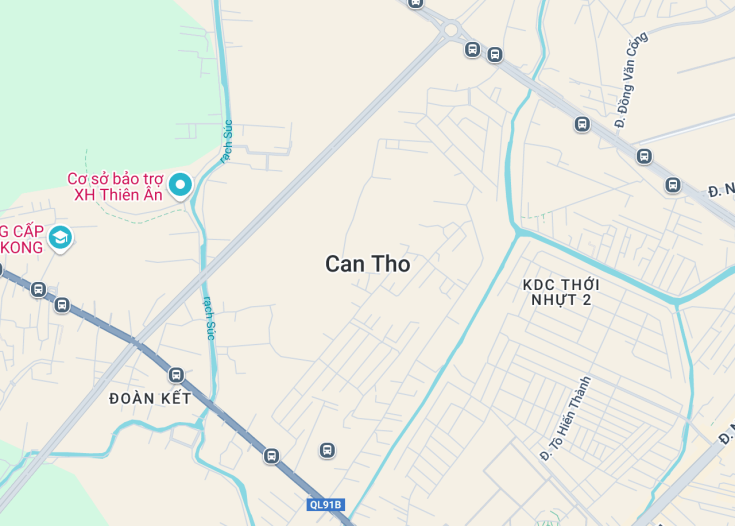Can Tho, the largest city in Vietnam’s Mekong Delta, represents a fascinating blend of vibrant cultures, bustling daily life, and serene landscapes. Here, the river is both a lifeline and a backdrop to floating markets, where boats brim with fruits and vegetables, creating a mosaic of colors on the water.
Beyond commerce, visitors can explore lush riverbanks, ancient pagodas, and tranquil backwaters. Can Tho is a gateway to understanding the dynamics of river life and the cultural richness of Vietnam’s southwestern region.
Visit Cai Rang Floating Market early in the morning to experience its lively atmosphere and to enjoy local breakfast specialties from a floating vendor.
For a deeper cultural immersion, consider a guided tour that includes a homestay in one of the riverine villages, offering firsthand experiences of daily life along the Delta.
Top things to do & see in Can Tho
Select the following sights and activities to discover best tickets and tours available in Can Tho.
Can Tho: The Vibrant Heart of the Mekong Delta
| Country | Vietnam |
| Time in Can Tho | GMT+7 |
| Language spoken | Vietnamese |
| Population | 1.24 million (Source: Vietnam’s 2019 Census) |
| Currency | Vietnamese Dong (₫, VND) |
| Airports | Can Tho International Airport (7 mi / 11 km). |
Can Tho, the largest city in the Mekong Delta, is renowned for its extensive waterways and lush rural landscapes, making it an essential part of Vietnam’s “rice basket”. With roots extending back to the Khmer Kingdom, this vibrant urban center is steeped in history and culture. It plays a crucial role in agricultural and economic sectors, hosting one of the biggest floating markets in Southeast Asia, Cai Rang, where commerce and tradition beautifully intertwine.
Where is Can Tho?
Located in southern Vietnam, Can Tho is the epicenter of the Mekong Delta, about 105 miles south of Ho Chi Minh City.
Distances:
| Route | Distance by car | Time by car |
|---|---|---|
| Ho Chi Minh City to Can Tho | 105 miles (169 km) | ~3 hours |
| Vinh Long to Can Tho | 22 miles (35 km) | ~45 minutes |
| Chau Doc to Can Tho | 87 miles (140 km) | ~2 hours, 30 minutes |
What is Can Tho famous for?
Can Tho is famous for its floating markets, particularly Cai Rang, which display a dizzying array of regional produce, goods, and vibrant local culture, attracting tourists and researchers alike.
History
Pre-Colonial Period (Before 1862)
The delta region, which includes Can Tho, was originally inhabited by Khmer people before the Vietnamese annexation in the early 17th century. The area was scarcely populated and covered in dense wetlands, making it largely inaccessible. Over time, Vietnamese settlers began to move into the region, cultivating the land and establishing small communities focused on agriculture and fishing.
Colonial Period (1862-1945)
Can Tho’s history during the French colonial era features significant development. The French, recognizing the area’s agricultural potential, developed a systematic cultivation of rice and built an extensive system of canals to improve irrigation and transportation. This development led to Can Tho becoming a vital agricultural hub in the Mekong Delta. The city saw further growth when a French garrison and several administrative buildings were established.
Post-Colonial Period and War Years (1945-1975)
Following the departure of the French, Can Tho became a focal point during the Vietnam War due to its strategic location. The city was used as a major logistics base by South Vietnamese and American forces. During this time, Can Tho experienced significant disruption but also infrastructure development, including the construction of bridges and roads that connected the city more effectively with other parts of Vietnam.
Modern Development (1975-Present)
After the war, Can Tho has been part of Vietnam’s push to modernize its infrastructure and economy. Recognized officially as a city in 2004, Can Tho has risen to prominence as a regional business and education center in the Mekong Delta. The opening of Can Tho University in 1966 and Can Tho International Airport in 2011 underscore the city’s development. The city has also become a tourist destination, known for its floating markets, vibrant river life, and rich cultural heritage.
Visit Can Tho
What to see and do in Can Tho, Vietnam
Visiting Can Tho, often referred to as the heart of the Mekong Delta, offers a plethora of engaging activities and scenic locations for any traveler. The city is famous for its floating markets with Cai Rang being the largest and most popular among them.
Early morning visits to the market provide a unique glimpse into local life, with hundreds of boats buzzing about, trading fruits, vegetables, and handicrafts.
- Explore the Binh Thuy Ancient House – a stunning example of 19th-century French colonial and Vietnamese architecture.
- Take a boat tour on the Mekong River to experience the natural beauty and biodiversity of the delta’s waterways.
- Visit the Can Tho Museum to learn about the region’s history and cultural heritage.
- Enjoy the lush greenery and peaceful scenery at the Can Tho Flower Garden.
Festivals and Events in Can Tho
Can Tho is vibrant with cultural festivities throughout the year, reflecting the rich traditions of southern Vietnam. The Lunar New Year (Tet Nguyen Dan), usually in January or February, is celebrated with great enthusiasm, featuring dragon dances, fireworks, and traditional food.
Another significant event is the Mid-Autumn Festival, where locales engage in mooncake preparation and lantern parades. Additionally, the annual Can Tho Flower Festival, showcasing exquisite local floral varieties and gardening innovations, attracts numerous visitors in December.
Best time to visit Can Tho
The ideal time to visit Can Tho is during the dry season, from December to April, when the weather is most stable, avoiding the heavy rains and high humidity typical of the wet season. This period also coincides with several local festivals, offering visitors a deep-dive into local culture and festivity.
Is Can Tho worth visiting?
Can Tho is undoubtedly worth visiting. It embodies the dynamic spirit of the Mekong Delta with its bustling floating markets, rich cultural history, and beautiful natural landscapes.
Whether you’re interested in exploring vibrant local traditions, savoring the culinary delights, or simply relaxing amidst serene waterways, Can Tho offers a well-rounded experience that caters to a variety of interests. The blend of tradition and modernity in Can Tho’s daily life provides an enriching experience for any traveler.








